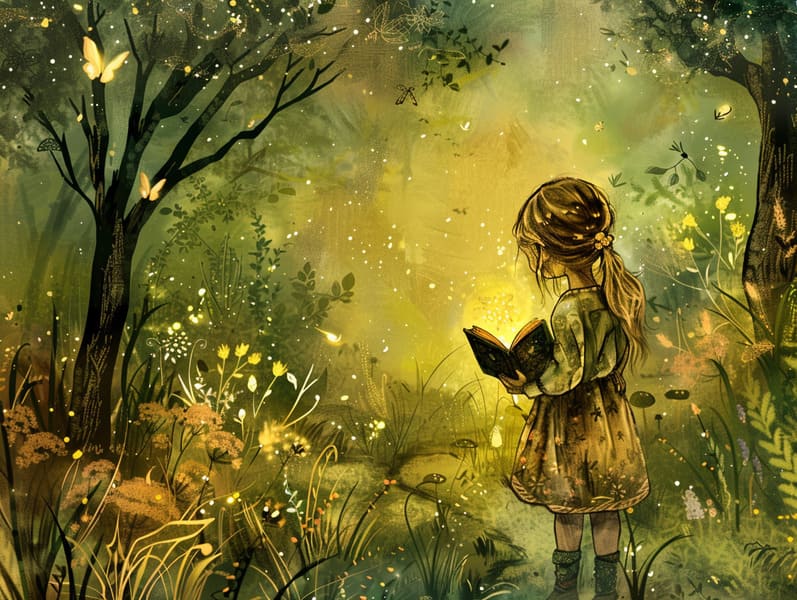Understanding the Enchantment of Evening Adventures: Creating Valued Occasions with Your Family
Understanding the Enchantment of Evening Adventures: Creating Valued Occasions with Your Family
Blog Article

Evening is a important time for kids and their parents. It’s a time to calm down, get cozy, and delight in the beauty of nighttime tales.
For ages, sleep stories for kids have been a adored tradition, offering more than just a way to nod off. They provide an chance for relationship building, knowledge acquisition, and fueling creativity.
The Meaning of Bedtime Stories
Evening stories for little ones go beyond a way to finish the day. They play a significant role in a child’s progress and in reinforcing the adult-child connection. Here’s why they are beneficial:
1. Together Time: Nightly storytelling encourages a special period of closeness between adults and their kids. It’s a moment of attachment that helps children feel loved and safe.
2. Vocabulary Building: Experiencing stories helps children develop their linguistic abilities. They learn new vocabulary, understand sentence structures, and sharpen their comprehension and interpretative skills abilities.
3. Imagination and Creativity: Stories for kids move them to fantastic worlds, nurturing fantasy. They visualize characters, settings, and adventures, which fuels their inventiveness.
4. Emotional Intelligence: Stories for little ones often include characters facing issues and states. These accounts help kids recognize and work through their own sentiments, developing emotional maturity.
5. Thinking Skills: Being read a tale helps children develop mindfulness, recollection, and logical thinking. They enhance to follow narratives, remember details, and predict outcomes.
How to Incorporate Bedtime Stories
Forming a sleep-time routine that features reading aloud stories is doable and worthwhile. Here’s how to establish a prized part of your bedtime tradition:
1. Choose a Comfortable Spot: Pick a quiet place where you and your child can huddle together without distractions. A snug bed or a peaceful reading nook works wonderfully.
2. Set a Consistent Time: Pick a routine time each night for bedtime stories. Regularity helps children predict and makes the practice easier to maintain.
3. Select Age-Appropriate Stories: Find tales that are tailored to your child’s understanding. Young kids might appreciate simple books with straightforward tales, while bigger children may be interested in complex plots with more detailed stories.
4. Get Involved with the Story: Ensure the tale become real by trying different voices for characters, adding audio effects, and encouraging your child to take part. Ask things about the story to keep them engaged.
5. Set a Tranquil Atmosphere: Turn down the lights, use whispers, and create a soothing environment to help your child calm down.
Finding the Best check here Bedtime Stories
There are abundant sources where you can find excellent bedtime stories for children. Here are some ideas to check out:
1. Kids’ Literature: Visit your local library or bookstore to find a diverse selection of bedtime stories for kids. Exploring the choices together can be a great activity that also gives children to get stories that interest them.
2. Online Sources: There are many web resources that offer free bedtime stories. Sites like kids' story platforms provide a variety of short stories for kids that you can download. These websites are great for finding new and diverse stories without fees.
3. Audio Books and Story Apps: For nights when you’re too exhausted to read, use audiobooks or storytelling apps. These can provide a gentle reading to read your child a story, ensuring they still get their bedtime story fix. Apps often offer interactive features that can involve them further.
4. Personal Stories: Write your own stories reflecting your child’s experiences. Personalized stories can be remarkably engaging and meaningful. You can incorporate your child in the narration process, making them a part of the adventure.
The Good of Short Stories
Brief stories for children are highly useful for bedtime. They provide all the plusses of longer stories but are more concise, making them perfect for preparing for sleep before sleep. Here’s why short stories are a great choice:
1. Effortless to Follow: Quick stories are uncomplicated and effortless for children to follow, even after a long day. They can speedily grasp the tale and enjoy the story without becoming uninterested.
2. Immediate Interest: Quick narratives swiftly engage children, keeping their engagement and wonder. This makes them perfect for keeping bedtime customs smooth yet enjoyable.
3. Diverse Options: Concise narratives allow for variety in your bedtime narrative. You can get a different story each night, keeping the routine interesting and exciting for your child.
4. Time Efficiency: For busy parents, short stories are a quick way to ensure children still get their nightly dose of storytelling. They fit well into a crowded schedule while still offering the full good points of a bedtime story.
The Power of "Read Me a Story"
The simple phrase, “Will you read me a story?” can bring a world of magic for children. Answering to this request not only caters to a child’s need for attention and engagement but also forms lasting experiences. Here’s why it’s special:
1. Tie: Telling tales to your child develops a deep emotional link. It’s a time for intimacy, sharing, and bonding.
2. Practice: Building a bedtime story tradition creates a prized tradition that children expect every night. It’s a custom that can be continued through generations.
3. Joint Growth: As you share stories, you’ll witness your child’s advancement and growth. Their interest, reactions, and understanding of the stories change, offering insights into their developing minds.
4. Protective Space: Bedtime stories provide a safe space for children to explore emotions, face fears, and find comfort in the known presence of a parent.
Final Note
Kids’ bedtime stories are a effective tool for encouraging a child’s maturation and crafting unforgettable memories of closeness.